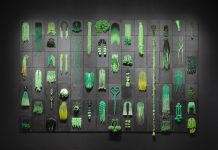Regarding his five-cycleÌýEuroperas, John Cage, the visionary American avant-garde composer, isÌýalleged to have said, âFor two hundred years the Europeans have been sending us their operas. Now Iâm sending them back.â
âHe was very much saying, âThese are your operas,ââ says Yuval Sharon, the 2017 MacArthur Grant-winning director who recently staged in an inspired production for the , of which he is the Gary L. Wasserman Artistic Director.
That interpretation not only emphasizes the pun in the name; it was also, Sharon says, a way for Cage to create distance between himself âas an American artist coming to Europe and the institution of opera,â which is traditionally European.
Various elements in Europeras 3 & 4, which premiered in London in 1990 and was staged in Detroit March 8-10, are determined by choice and by chance: cast members are invited to choose arias from throughout the operatic canon, which they then performâone after the other, and frequently simultaneously â without a unified or coherent set, costume, or, most importantly, storyline.
Decisions about where to stand, what to wear, and anything else happening on-stage are left to the I Ching, a form of ancient Chinese divination that became instrumental to Cageâs composition process.
The result, in Sharonâs interpretation, was a ghostly, otherworldly cacophony made up of fragments and scraps of sound, bits of melody occasionally cut off mid-lick.
A numbered grid overlaid the stage, which cast members traversed, each apparently dressed for whichever opera had originally birthed them. In-between, black-clad figures danced or carried in props. A chair was silently introduced to the stage; then a cake was; a woman dipped her finger in the frosting.
Donât worry about recognizing melodies or making sense of all this, Sharon told the audience; they should wander freely through the sounds they were presented with. Europeras, in any case, seems to have less to do with meaning something (or anything) than with the tactility of experience, the particularities of the physical world.
Cage, Sharon says, âthinks about the basic components that make up music and the experience of music and asks us to question everything about it.â
Coming to a theater to hear music is a convention so basic, for example, it hardly bears questioning. And yet, when Cage is involved, the experience is upended. Periods of silence in Europera 4 prompt the audience to search for sound elsewhere (not unlike Cageâs famously silent 4â33â). In a theater packed with people, of course, there are no true moments of silence: pauses are filled with coughs, throat-clearings, clothes-rustlings, and whispers of skin against skin, as Cage casually subverts the usual audience-performer end of things. Whoâs the performer now?
Sharon also thinks Cage had something populist in mind, that âEur/your operasâ can also be interpreted in this way: âThese are your operas, members [of] the audience, these are your pieces to do and to experienceâḊhowever youâd like to experience them.â
Meanwhile, the singersâwhen they were singingâappeared to be in purgatory, each one stripped of their opera, context, and raison dâÃẂtre, but condemned to sing regardless.
Europeras might be Cageâs response to centuries of European tradition, but whether he thought this kind of patchwork paper-shredding was all American culture had to offer, or whether he meant to returnâirrevocablyâall this opera stuff to its original source, isnât clear: with Cage, it likely never is. His approach is more playfully disruptive than it is narrowly selective.
That makes Sharon the perfect conduit for carrying Cageâs work into the present day. His approach seems simpatico and, in his hands, Europeras 3 & 4 took on the logic of a nightmare, or a childâs cartoon, or bothâand that isnât a criticism.
In 2018, Sharon staged Europeras 1 & 2 in L.A. with The Industry (which he founded and where he is Artistic Director) and the Los Angeles Philharmonic. Each experience staging Cage, he says, âfeels like a complete reset of all my expectations of opera. I hear opera differently, I think about opera differently, and it just gives [me] a sense of so much potential.â
May that âresetâ play out like a palate cleanser not only for Sharon but for his audiences, the Detroit Opera, and the city at large. I felt utterly unmoored by Europeras 3 & 4, as though I were sitting up on Mars. Iâd like to feel that way more often.
Next up for the Detroit Opera is composer Missy Mazzoliâs Breaking the Waves, an interpretation of a Lars von Trier film directed by Tom Morris and conducted by Stephanie Childress, which premiers Saturday, April 6; and JanÃḂÄekâs The Cunning Little Vixen, which Yuval Sharon will also direct, with the companyâs new music director, Roberto Kalb, stepping in to conduct, beginning Saturday, May 11.
For more information on Detroit Opera, including their just released 2024-25 season of opera and dance, visit and read even more arts and entertainment at hourdetroit.com.Ìý
|
| Ìý |
|








